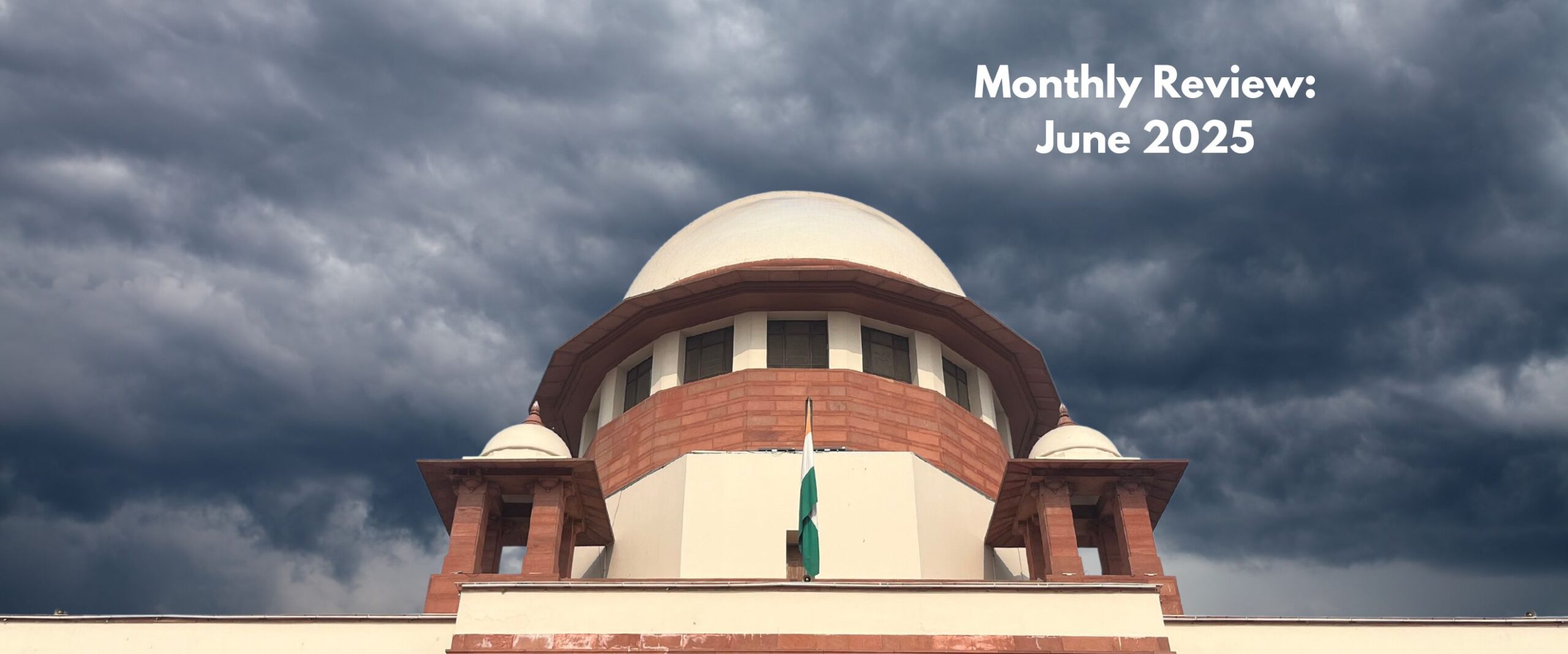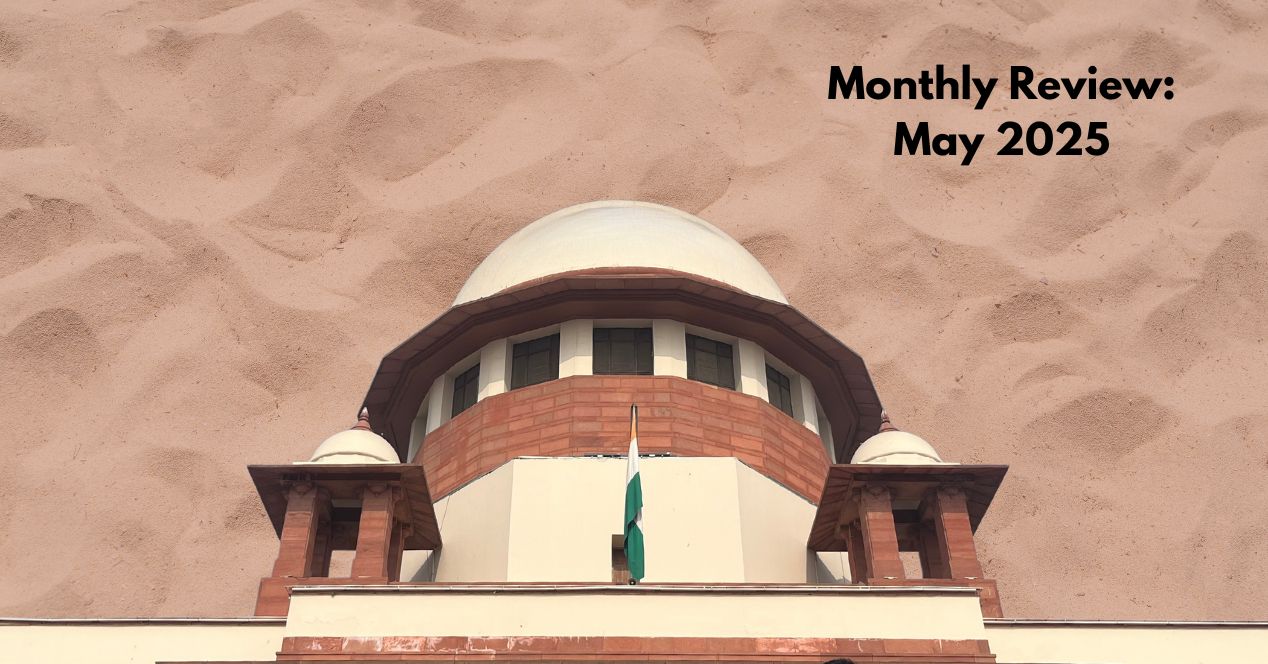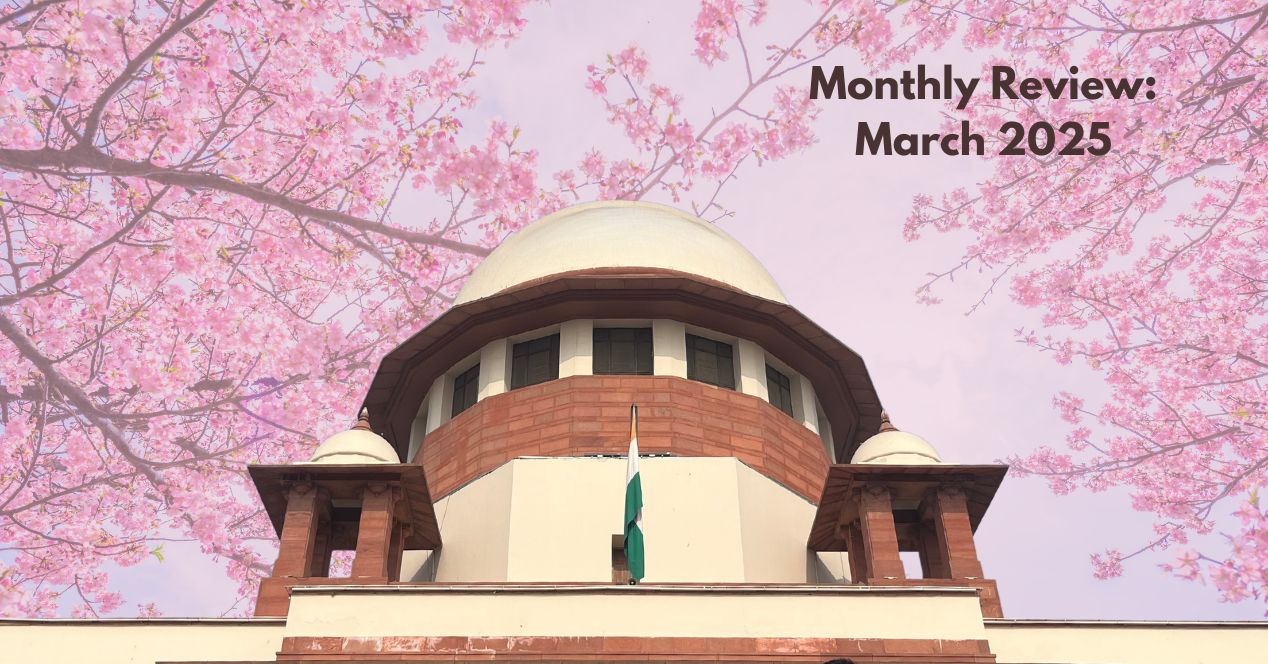Analysis
Monthly Review: June 2025
June 2025 saw the retirement of Justice BM Trivedi; partial working day benches took up key matters on free speech, detention and bail

In June 2025, the Supreme Court observed its Partial Working Days and took up fewer cases. During this time, Justice Bela Trivedi retired from the top court. Moreover, the Court took up the case relating to the ban of the movie ‘Thug Life’ in Karnataka.
There were new developments in the Justice Yashwant Varma cash-row as well. Meanwhile, the month saw the 50th anniversary of the Emergency.
This monthly review consists of SCO’s coverage in June and other developments.
Justice Bela Trivedi retires
On 9 June, Justice Bela Trivedi retired after a tenure of three and a half years as a Supreme Court judge. She was elevated in August 2021 and hailed from the Gujarat High Court. She was known to be a controversial judge especially in personal liberty matters. Our notable judgements list some of these judgements and other key opinions on affirmative action and POCSO issues.
Justice Varma Row
On 19 June, The Leaflet website published the report prepared by the three-member committee investigating the Justice Yashwant Varma cash-row. The controversy began after burnt cash was discovered in his official residence during a firefighting operation in March 2025. The committee found “strong evidence” that the judge and his family had “tacit or active control” of the store room where the cash was found. The committee recommended the removal of Justice Varma, who is currently a judge at the Allahabad High Court.
The ‘Thug Life’ saga
On 19 June, the Karnataka government assured a safe screening of Kamal Haasan’s ‘Thug Life’. The movie, released worldwide on 5 June, was not put on the screens in Karnataka following Haasan’s comments on Kannada being the “daughter” of Tamil. The remark had caused a row across the state resulting in an extra-judicial ban on the film. A bench of Justices Ujjal Bhuyan and Manmohan had observed that the ban was contrary to the rule of law. It also came down on the Karnataka High Court for urging an apology from Haasan for his statement.
No ‘detention’ today
On 27 June, a Bench of Justices Ujjal Bhuyan and K.V. Chandran set aside the preventive detention of a law student, who had been held under the National Security Act, 1980 (NSA). The student was linked to a case involving an alleged assault on a professor, for which he surrendered. The NSA continued to keep him under custody after he secured a bail. The Court observed that preventive detention is only allowed in instances when a person is a threat to “public order”. The bench held that the detention was “wholly untenable”.
The Right to Truth
On 9 June, the Supreme Court in Amlesh Kumar v State of Bihar clarified its position on an accused’s right to seek a voluntary narco-analysis test. The Court reiterated Selvi v State of Karnataka (2010) which held that forceful subjection of an accused to a narco-analysis test constituted a violation of personal liberty. The Judgement held that the accused may request a test when exercising the right to lead evidence in a trial, however this is not an indefeasible right.
Compensation for the bailed
On 25 June, the Supreme Court granted ₹5 lakh compensation to a man who had spent 28 days in prison after he was granted bail by a Trial Court. The bench of Justices K.V. Vishwanathan and N.K. Singh found that the release was denied to the man on “hyper-technical grounds”.
Four weeks, 20 judgements
In June, we published five important judgements from the top court on Mondays each week as part of our Supreme Court Observer Law Reports series. Our June issues covered bonus decisions from January to May 2025 too. All of them can be accessed in an HTML format on our SCO.LR page.
Issues 1 and 2 highlight key judgements from 1 June to 15 June. With the Court shift to partial working days, and the reduction in the number of judgements delivered, Issues 3 and 4 brings you bonus judgements from each month between January to May.
SCO’s coverage on 50 years since the Emergency
25 June 2025 marked 50 years since the India Gandhi government declared the Emergency. Central to that period was the Supreme Court’s decision in ADM Jabalpur v Shivkant Shukla (1977), which upheld the suspension of critical fundamental rights. In our commentary, Ravi Nair writes about how civil liberties have fared since then .
One of the fundamental rights severely impacted during this period was the right to life and personal liberty under Article 21. We published a timeline mapping the evolution of the right through Supreme Court precedents.
Many journalists and political opponents were detained under the Maintenance of Internal Security Act, 1971, backed by Article 22, the provision concerning preventive detention. V. Krishna Ananth highlighted that this constitutional provision still exists in the pages due to a deep-seated anxiety regarding individual liberty.
After the Emergency, Justice H.R. Khanna, the sole dissenter in the ADM Jabalpur judgement, was superseded and not appointed the Chief Justice. Prior to that, three judges were superseded due to the ‘basic structure doctrine’ judgement. We wrote about how the Emergency eventually led to the birth of the collegium system.
SCO’s Analysis and commentaries
In May, the President of India referred 14 questions to the Court, following the decision in State of Tamil Nadu v Governor of Tamil Nadu (2025). In our commentary, Senior Advocate M.R. Shamshad writes about how the questions have already been decided by the Court and would amount to re-litigation.
On 20 May, in a petition by the organisation We the Women of India, the Supreme Court directed all states and Union Territories to ensure the effective implementation of the Protection of Women from Domestic Violence Act, 2005. This included the appointment of Protection Officers and the identification of shelter homes. The Court also directed circulation of information regarding the availability of free legal aid to aggrieved women, among the public.
In May, the Supreme Court upheld the State Governments’ authority to impose entertainment tax on Direct-to-Home (DTH) providers. DTH providers were liable to pay both service and entertainment tax to the Union and state governments respectively. The Court favoured the argument based on the “double aspect theory”, that a single transaction can have two distinct, taxable elements. DTH providers had argued that they had to pay only service tax as the transmission of signals is a “service” and does not provide entertainment. We wrote about the effects of the judgement and how it affects a struggling DTH market.
In May, a Bench of Justices B.V. Nagrathna and S.C. Sharma granted bail to a man accused under the Uttarakhand Freedom of Religion Act, 2018 and the Bhartiya Nyaya Sanhita, 2023. It was alleged that he concealed his faith from the woman he was married to. The decision came at a time when a batch of petitions regarding the constitutionality of anti-conversion laws remain pending before the Court.




